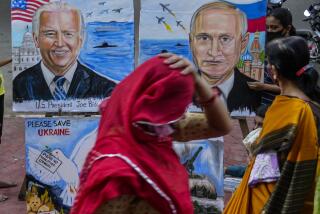India, Pakistan Pledge End to Kashmir Strife
- Share via
NEW YORK — After their first meeting, the leaders of nuclear rivals India and Pakistan said they had opened a new chapter in their countries’ troubled relations, and resolved to work toward a peaceful end to the 57-year-old conflict over Kashmir.
In a signal that economic cooperation might ultimately triumph over military conflict, they also agreed to study a plan for a gas pipeline between the countries.
Pakistani President Pervez Musharraf and Indian Prime Minister Manmohan Singh met for an hour in a New York hotel on the sidelines of the opening week of the United Nations General Assembly.
“I sincerely believe that today is an historic day,” Singh said. “We have made a new beginning.”
Musharraf echoed that sentiment as he read from a joint statement, promising to work for peace.
Just two years ago, the two nuclear-armed neighbors were on the verge of war because of their dispute over the Himalayan territory of Kashmir. But after brinkmanship failed, and Singh expressed willingness to Musharraf to reopen talks after he became India’s prime minister in May, both came to the table.
“Both of us agreed today that we have a unique opportunity to reverse the adverse tide in the affairs of our two countries,” Singh told the Council of Foreign Relations in a speech after the morning meeting.
The leaders set out a schedule for meetings. They will meet next month in New Delhi during a technology summit, then again in Dakar, Senegal, in January. In February, their foreign ministers will review the progress that has been made, Singh told the Council on Foreign Relations.
Analysts said the New York meeting was a promising thaw in long-frosty relations, but cautioned that previous breakthroughs had ended in breakdowns. India and Pakistan have fought three wars and had numerous border skirmishes since Pakistan was created after the 1947 partition of the former British India.
Though the people in both countries are weary of the conflict in Kashmir, the leaders must contend with entrenched groups that don’t want to see concessions, said Husain Haqqani, a visiting scholar at the Carnegie Endowment for International Peace and a former advisor to the Pakistani government. In Pakistan, the powerful military derives its authority from the aspiration to win Kashmiri territory. In India, Kashmir is a potent rallying issue for nationalists.
“Their meeting reflects a desire to reduce tensions without eliminating them,” Haqqani said. “The only substantial thing offered today was a pipeline, and pipelines -- like babies -- are easy to conceive and difficult to deliver.”
Singh and Musharraf said in the days before the meeting that they intended Friday’s talks to be largely symbolic and did not expect any particular outcome.
“I don’t think we are going to sit there and discuss options and then come to a solution,” Musharraf said Thursday at a news conference at the United Nations. “More important is to judge each other’s expectations.” Musharraf also noted that he was born in India and Singh in what is now Pakistan. “That’s good ground for understanding,” he joked.
At the beginning of the meeting, Musharraf presented the Indian prime minister with watercolor paintings of Singh’s childhood village and school, along with a copy of his report card, noting that Singh received better grades than he in everything except math.
Singh responded with a couplet in Urdu, one of Pakistan’s main languages, to make the point that India and Pakistan must seize the moment to make peace.
More to Read
Sign up for Essential California
The most important California stories and recommendations in your inbox every morning.
You may occasionally receive promotional content from the Los Angeles Times.










